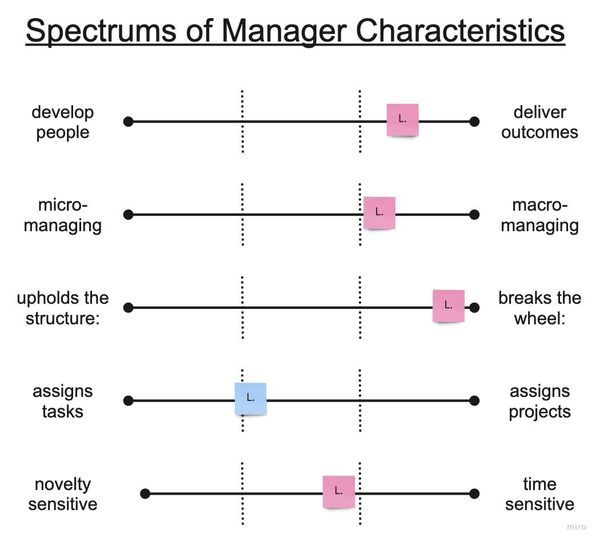Table of contents
When I started reading business books in my mid-20s, I was annoyed.
The reason was simple: Everybody talked about “bringing” value to your customers and others in general but without any work experience it did not translate into something concrete.
When I started working though, I began to understand something that I intuitively understood all along: Bringing value means mostly understanding what the other person wants and/or needs. So, I doubled down on trying to empathize with my clients and work colleagues which brought me where I am today.
The goal is - no matter if you are an employee or if you serve clients in management positions - to help your manager succeed to succeed yourself. We can make it easier for our managers to help us by taking into account their objectives, preferences, motivations, and their work style when "serving” them. Hence, the question we will go through is: How?

The most important Step: Understand what is important to your Manager
Disclaimer: I am thinking about a client when writing this, which is why I will address the manager as a man. And I am viewing it as a consultant but you can copy/paste the approach as an employee, too.
This step is very simple: I sit down with him and ask questions:
- “How did you get to your position?”
- “Are you happy with your work recently?”
- “What are your goals for this year?”
- “What are your main challenges in achieving your goals and in your daily work?”
- “What are the next steps for you personally?”
- “Where do you see the company heading?”
- “What do you think about your team (us)?”
I usually get a good understanding of his positioning and his way of thinking. Next, I plot my observations and intuition against some spectrums in different categories to adapt my way of working to his. The categories are:
- Management Style - develop people vs. deliver outcomes
- Priorities & Preferences - micro vs. macro-managing
- Positioning in Organization - uphold the as-is vs. break the wheel (gif)
- Assignments - tasks vs. projects
- Consuming information - novelty-sensitive vs. time-sensitive
I also included the assignment of myself (for the people working for me^^).
Every category I describe is split into:
- the spectrum with two extremes
- suggested tactics for both preferences on the spectrum
If you want to use the board yourself, feel free to copy mine into your miro.
How does your Manager manage his team(s)?
Develop People: These Managers are motivated by engaging with their people, regularly checking in on how you are doing, and caring about harmony in the team. They tend to organize additional teambuilding events and casual evening events to bring the team closer together.
Deliver Outcomes: This is the category my client falls in. He is motivated by delivering outcomes on his roadmap, being very internal-customer-driven, known to be demanding towards subcontractors, and regularly cuts people due to their bad performance. Exactly my taste of a Manager by the way. On the other hand - if you know him well - he is a very sweet soul, an absolute family man, and will always take over your workload if you raise your hand when being overwhelmed. But when we are at work, we are at work!
Managers indexing towards “develop people”:
- Clarify your career aspirations and/or skill-stacks
- Ask for help creating a plan or getting into a leadership program
- Get along with everybody and try to avoid your ego
- Acknowledge other team member’s work
- Invest in your personal relationship as much as you can
Managers indexing towards “deliver outcomes”:
- Above all else, I am getting the work done I commit to
- I try to ensure that all the results are presentable (under his name) to his Management
- Towards other collaborations partners, I am being very competitive and do not avoid conflicts if I see people underperforming
- Regularly, I share ideas for how we could make those outcomes for our internal customers even better
- Sometimes, I ask him if there is anything else (out of my scope) that needs to get done
What are his preferences in managing his team(s)?
Micro-managing: These are managers who value specifics and expertise. They see a combination of perfection in results as well as in documentation to align everybody all the time. They value being asked for their opinion, give you profound insights and feedback to make your deliverable great.
Macro-managing: My client falls into this category. He does not care about details as long as everything is on track. It is just important to him that I tell him when we are stuck or if a milestone has been passed.
Indexing more towards “micro-managing”:
- You should always ask for feedback
- Don’t hesitate to point out minor details that you see missing or could be done differently
- You should always update them about the status of your work and make sure you check in regularly
- Their approval of your approach and milestones is of high importance
Indexing more towards “macro-managing”:
- I take full ownership of my projects and get things done without asking for permission or supervision
- I inform him about the status of my work and communicate progress irregularly
- I make sure to present to him the results and the success of my work
- I only involve him only when I need an escalation (push a thing through) or if I need very specific information, which I know only he can provide
How does fit into the organization he is part of?
Upholds the structure: Managers who are part of the power structure usually don’t want to be seen as rebellious. They like to do things as are (and have always been) and are only motivated to change when it is externally caused (e. g. a restructuring program).
Breaks the wheel: These are managers who absolutely despise the status quo. They question the structure, the rituals, procedures, tools, and how success itself is being measured. They inherit a high correlation with being outcome-driven (category 1) because they need to prove that their way of working is more productive.
My client falls exactly in between both categories. He is an outlier as he is much more internal-customer-oriented and an innovator in his domain. At the same time, he knows the power structure and complies with it regarding processes as well as the over-respect of the higher management.
Indexing more towards “uphold the structure”:
- Show your manager that you comply with the ways of working in their organization
- Refer to formal documents
- Be very thoughtful and deliberate with what feedback you give and the improvements you suggest. If it can be avoided (if it’s not significantly impacting your experience working), let it go.
Indexing more towards “break the wheel”:
- Proactively point out examples of where things could be better and deliver a mean to implement it
- Share feedback on existing team conditions and new ideas for improvements liberally, even half-baked ones
- Openly criticize other team members or members of other teams and organizations (if you have a good reason to do so, not deliberately!)
- Focus those ideas on topics that align with the other indexes of your manager. For example, if your manager indexes high on “deliver outcomes”, share ideas for ways how to maximize the performance
What is his expectation when bringing you work assignments?
Assigns tasks: Managers who assign tasks share small scopes and expect you to come back to them when those workstreams are accomplished.
Assigns projects: Managers who assign projects (meaning a goal without specific tasks) share the problem statement and expect you to come up with How to achieve the outcome. This is the way of working for my client who just throws over a few bullet points, a few stakeholders, and what they want to achieve.
Remark: As an ambitious operator, it should be your goal to increasingly build trust with your managers such that they increasingly assign projects over tasks.
Indexing more towards “assign tasks”:
- Nevertheless, align on the bigger context your tasks are part of to ensure you are on the same page about the direction. Then do the work very well and very quickly and proactively propose the next task list.
- Push yourself towards the ‘assigns project’ end of the spectrum by always asking what the overall goals are, and measuring, respectively reporting about the deliverables
Indexing more towards “assign projects”:
- I ask about the principles for the project (how was the goal created or why has the project been set up?)
- I communicate most decisions (especially at the beginning so I don’t end up running down the wrong path!!)
- I track the progress in a presentation so he is always able to present the status to other stakeholders or his management. If you are really good, then provide updates depending on your manager’s style of managing their team as well as their preference for consuming information
What is your manager’s preferred way of consuming information?
Novelty-sensitive: Managers who are novelty-sensitive want to always be on top of things. They like coming to your meetings, being cc’d on your emails, and prefer regular updates (usually weekly).
Time-sensitive: Managers who are time-sensitive want to see only the most critical pieces of information. They prefer irregular updates, curated presentations (management summaries), and short emails.
Remark: Neither of these should be confused with micro-management. These are just styles for consuming information to make it digestible within their schedule as well as their daily routines.
Indexing more towards “novelty-sensitive”:
- Overshare with meeting and email invites (make activities opt-out versus opt-in for them)
- Ask for observations, feedback, and learnings on a regular basis
- Create a formal artifact at the beginning and end of a project that gives them the chance to “stamp” your deliverables
Indexing more towards “time-sensitive”:
- I ask him what his preferred format and frequency for my deliverables (presentation, formal briefing, written memo regularly, or ad-hoc) is and whom he might present it to
I hope this clarifies that you are responsible for progressing in your career and not your manager.
